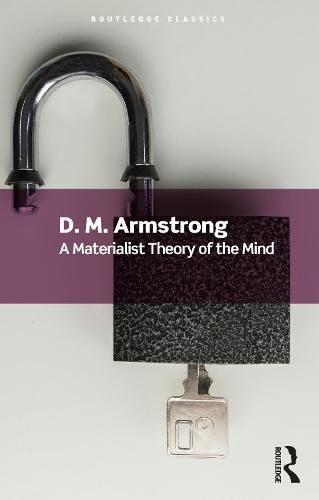Readings Newsletter
Become a Readings Member to make your shopping experience even easier.
Sign in or sign up for free!
You’re not far away from qualifying for FREE standard shipping within Australia
You’ve qualified for FREE standard shipping within Australia
The cart is loading…






D. M. Armstrong’s A Materialist Theory of the Mind is widely known as one of the most important defences of the view that mental states are nothing but physical states of the brain. A landmark of twentieth-century philosophy of mind, it launched the physicalist revolution in approaches to the mind and has been engaged with, debated and puzzled over ever since its first publication over fifty years ago.
Ranging over a remarkable number of topics, from behaviourism, the will and knowledge to perception, bodily sensation and introspection, Armstrong argues that mental states play a causally intermediate role between stimuli, other mental states and behavioural responses. He uses several illuminating examples to illustrate this, such as the classic case of pain.
This Routledge Classics edition includes a new Foreword by Peter Anstey, placing Armstrong’s book in helpful philosophical and historical context.
$9.00 standard shipping within Australia
FREE standard shipping within Australia for orders over $100.00
Express & International shipping calculated at checkout
D. M. Armstrong’s A Materialist Theory of the Mind is widely known as one of the most important defences of the view that mental states are nothing but physical states of the brain. A landmark of twentieth-century philosophy of mind, it launched the physicalist revolution in approaches to the mind and has been engaged with, debated and puzzled over ever since its first publication over fifty years ago.
Ranging over a remarkable number of topics, from behaviourism, the will and knowledge to perception, bodily sensation and introspection, Armstrong argues that mental states play a causally intermediate role between stimuli, other mental states and behavioural responses. He uses several illuminating examples to illustrate this, such as the classic case of pain.
This Routledge Classics edition includes a new Foreword by Peter Anstey, placing Armstrong’s book in helpful philosophical and historical context.